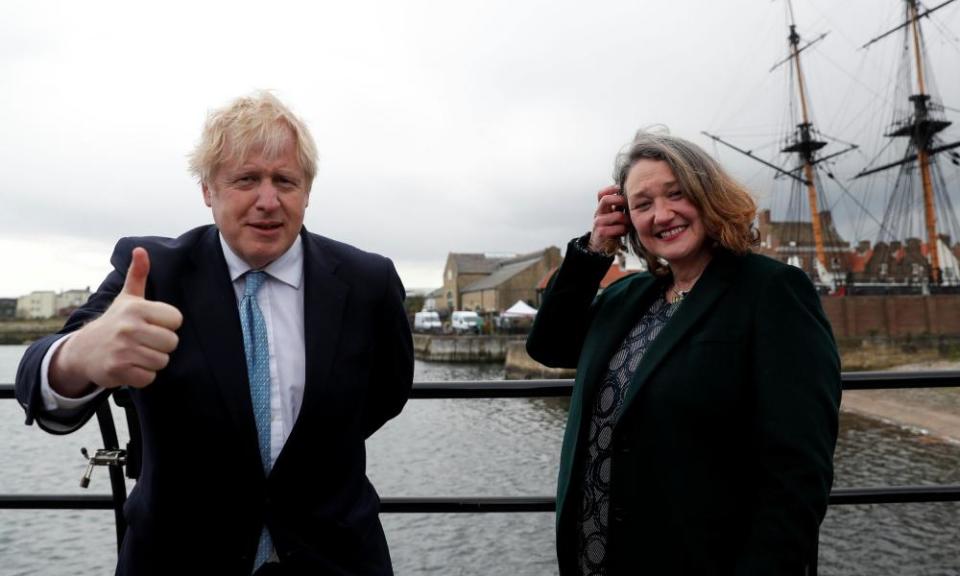So who are you again? Boris Johnson meets the new MP for Hartlepool

The real surprise was that anyone was surprised. Over the last few days the polls had looked desperate for Labour and it would have been astonishing if the Conservatives hadn’t easily won the Hartlepool byelection.
And sure enough those who had voted for the Brexit party in the 2019 general election moved en masse to the Tories and Hartlepool went blue for the first time since the constituency had been created back in the mid-1970s. So what with the end of the Brexit party and the vaccine bounce, the byelection had been an accident waiting to happen for Labour.
But part of the job description for any politician is to be able to look surprised by the entirely predictable, so it was inevitable that Boris Johnson would take the first train up to Hartlepool to do a quick victory lap. Though on arrival he was unnerved by one member of the welcoming committee. “Who’s that woman hanging around in the background?” he asked the Tory party chair, Amanda Milling.
“That’s Jill Mortimer,” Milling had replied.
“Who is she?”
“The new Conservative MP.”
“Cripes. Thanks for letting me know.”
“No problem. No one in Hartlepool really knows who she is either. She doesn’t come from round here and her whole campaign was based on knowing next to nothing about the constituency.”
“So how did she win?”
“Because she wasn’t representing Labour and, unbelievably, the Labour candidate was even worse. Now do try not to gloat too much as it’s not a great look. You’re here to look humble and promise to deliver whatever it was we promised to deliver on.”
Half an hour or so later, Boris stopped to do a brief interview with Sky as he walked along the seafront. Was it really such a shock to have won the byelection given the demise of the Brexit party and the vaccine bounce? Absolutely, said Johnson, somehow managing to sound sincere. The margin of victory had caught even him by surprise. Though he was delighted that voters had seen that the Conservatives had succeeded in getting Brexit done and he was now determined to deliver on his promise to level up across the country.
Just as soon as he had worked out what levelling up meant. The fact that levelling up and offering equality of opportunity were things that every government in the last 50 years had promised and failed to do was rather beside the point. For reasons that even Boris couldn’t quite fathom, voters seemed to trust him. Which was more than could be said for most of his family. To not know him is to love him. His friends were sick of his stories; the rest of the country seemed unable to get enough of them.
“Are you sure you don’t have a question for Jill?” Johnson said as the interview wound to a close. Er, no. No one wanted to speak to Jill. And no one seemed more pleased about that than Jill herself. She hadn’t had much to say in the campaign and she had nothing to add to that now.
Back in London, things were going from bad to worse for Keir Starmer. It wasn’t just Hartlepool where Labour had tanked. It had also haemorrhaged support to the Tories in the local council elections. Not so much a defeat as a total humiliation. And now he too was obliged to give his first televised take on what had been a disastrous set of election results.
Related: Keir Starmer: Labour has spent too long talking to ourselves
“I take full responsibility,” he began. The Labour leader tried to sound bullish. As if he understood the problem and had the answers. But he looked crushed. Devastated even. He had been expecting a bad day, but this was way worse than his worst fears. He went on to say he would do whatever it took to make Labour electable again, but he was really out of ideas. Other than by trying to reinvent himself as a populist who would promise to give the country whatever it said it wanted.
It wasn’t a question of left and right, he insisted. Labour needed to stop quarrelling and face the country – something that might have been more convincing if the first response of the party had not been for its two competing wings to kick lumps out of one another. Labour also needed to reflect and understand. Most voters will probably be remembering that Starmer had said much the same when he had become leader more than a year ago; but maybe reflection and understanding takes longer than he thought.
What Labour needed most of all, though, was a bold vision, he added. And what was this bold vision? It was this vision that was bold. Starmer didn’t get any further than this as Sky news broke off the interview in mid-sentence to go live to Liverpool where Joanne Anderson had been elected city mayor. It just about summed up Starmer’s day. Wherever the bold vision was, it wasn’t with him. For the moment he had been downgraded to an irrelevance. It was going to be a long way back for him and for Labour.

 Yahoo Finance
Yahoo Finance 